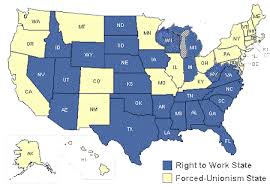Why Hillary? Because Manufacturing Moves to Right To Work States
< < Go Back
Updated 9/22/16: Hillary Clinton confused over why she isn’t ahead of Donald Trump by 50 points explains how she hates ‘right to work’ and implores union bosses to have their members vote for her.
from The Gray Area:
What do you notice about this map? Obviously a growing number of Right to Works States, now a majority (26) vs Forced Union Dues States (24). But doesn’t it also look like the national election map? The Right to Work States pretty much mirror states that vote Republican in national elections. States with Forced Unions dues include states with decaying cities (Detroit), exorbitant cost of living (New York, Los Angeles) and high state and local taxes.
The Right to Work states include high job growth states like Texas, Tennessee, North Dakota, etc.
Seems easy to see the positive impact when unions are not allowed to extort money from your citizens.
More From NRTWC:
Most factory jobs now found in States barring forced union dues.
“No one should be forced to pay tribute to a union boss in order to get or keep a job,” the 58-year-old National Right to Work Committee says on its website.
The committee and a sister organization, the National Right to Work Legal Defense Foundation, actively fight against closed shop rules. Right-to-work proponents have called for a federal law as opposed to the current patchwork of state statutes.
More From NRTWC:
To clarify the intentions of all the announced candidates seeking the GOP and Democrat presidential nominations, last fall the Committee mailed questionnaires to their campaigns, asking where the candidates stand on nine key compulsory-unionism-related issues.
And on December 28, the Committee turned up the heat by mailing letters to 192,000 New Hampshire (the first primary state) and Iowa households in which at least one identified Right to Work supporter resides.
The letters mobilized freedom-loving Granite Staters and Hawkeyes to contact the candidates and urge them to take a clear stand against compulsory unionism.
“For decades, polls have shown that the vast majority of Americans who regularly vote in federal elections believe laws and other policies that favor forcing workers to pay union dues or fees as a condition of employment are just plain wrong,” said Mr. Mix.
More From USAToday:
When Michigan officially became the nation’s 24th right-to-work state in March, Gov. Rick Snyder, who pushed the deeply controversial law through the Legislature in December, hailed it as a boost for the state’s economic recovery.
“I think it will bring jobs to Michigan,” he said.
With the Michigan law in effect for only a matter of months, it is still too early to tell whether it has made a difference. Michigan’s unemployment rate—while far from its highs during the financial crisis—remained above the national average at 8.4% in May. Michigan has enjoyed a surge of manufacturing jobs, but that began following the auto bailout in 2009, when closed shops were still legal in the state.
One immediate effect of the right-to-work law, however, was to improve Michigan’s rank among America’s Top States for Business. The Wolverine State moves to 29th place overall from 33rd last year. The improvement is led by a big jump in our Workforce category, which gives extra points to right-to-work states. We rank Michigan’s workforce 15th this year, compared with 38th in 2012.
More From Manufacturing.net:
The pro-job environment in right-to-work states is paying off with new automotive jobs. Tennessee is the home of Volkswagen’s new $1 billion auto assembly plant, as well as plants operated by Nissan and GM. Alabama boasts billion-dollar plants operated by Mercedes-Benz, Honda and Hyundai. Texas enjoys a large automotive manufacturing presence with Peterbilt, GM, International and Toyota. One reason for these states’ growing success in the automotive industry is their strong right-to-work laws embodying a commitment to a worker’s right to choose not to be part of a labor union. Right-to-work laws are an important factor to companies considering where to set up new operations.
In the … states with right-to-work laws, workers cannot be forced to join unions, or to pay union dues if they decide not to join. In non-right-to-work states, workers must join unions or pay union dues to keep their jobs. If an employee working in a non-right-to-work state fails to join the union or pay union dues then the union forces the company to terminate the employee.
What does the automotive industry’s decision to set up shop mean for these right-to-work states? It means jobs and increased tax revenues. An analysis by the University of Tennessee predicted that Volkswagen’s recent investment will raise incomes in the region by $511 million annually and will generate more than $55 million per year in new tax revenues. Other automotive manufacturers and component suppliers are spending billions in upgrades and new construction at plants in right-to-work states.




